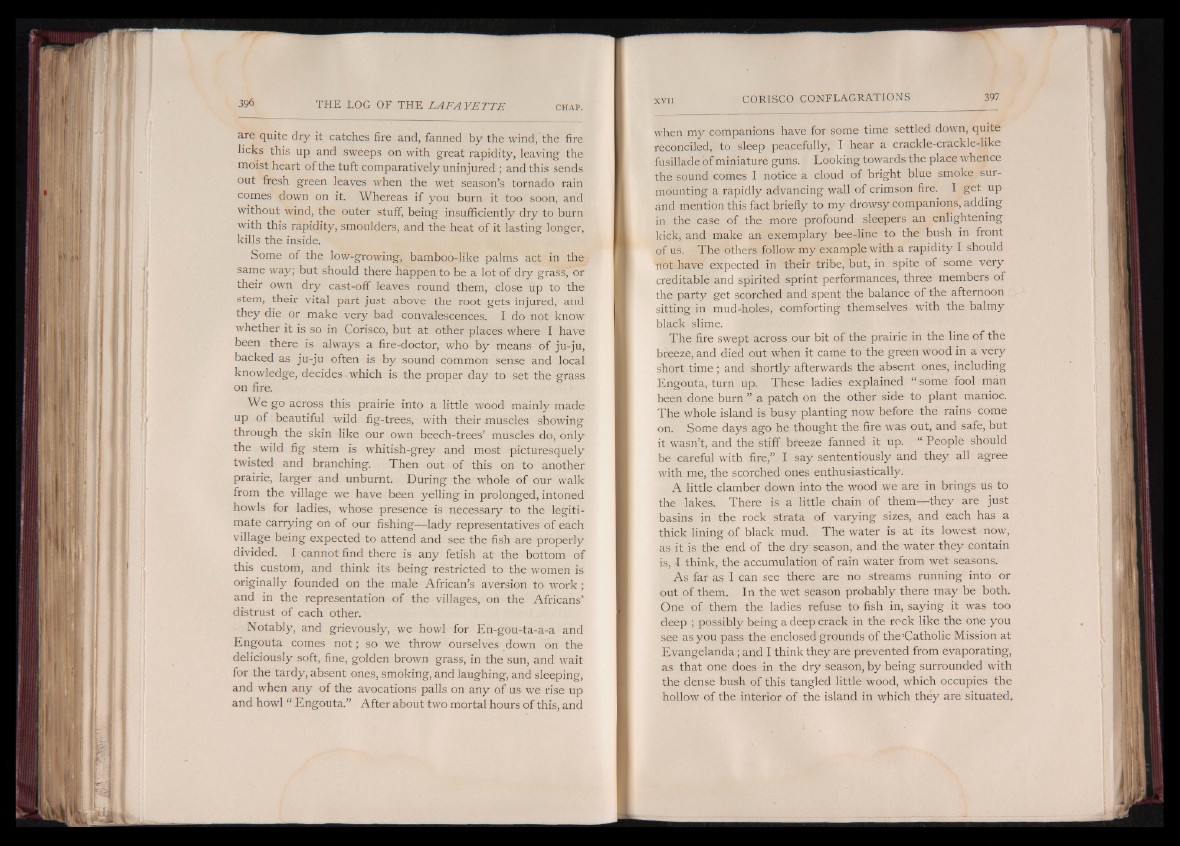
are quite dry it catches fire and, fanned by the wind, the fire
licks this up and sweeps on with great rapidity, leaving the
moist heart of the tuft comparatively uninjured ; and this sends
out fresh green leaves when the wet season’s tornado rain
comes down on it. Whereas if you burn it too soon, and
without wind, the outer stuff, being insufficiently dry to burn
with this rapidity, smoulders, and the heat of it lasting longer,
kills the inside.
Some of the low-growing, bamboo-like palms act in the
same way; but should there happen to be a lot of dry grass, or
their own dry cast-off leaves round them, close up to the
stem, their vital part just above the root gets injured, and
they die or make very bad convalescences. I do not know
whether it is so in Corisco, but at other places where I have
been there is always a fire-doctor, who by means of ju-ju,
backed as ju-ju often is by sound common sense and local
knowledge, decides. which is the proper day to set the grass
on fire.
We go across this prairie into a little wood mainly made
up of beautiful wild fig-trees, with their muscles showing
through the skin like our own beech-trees’ muscles do, only
the wild fig stem is whitish-grey and most picturesquely
twisted and branching. Then out of this on to another
prairie, larger and unburnt. During the whole of our walk
from the village we have been yelling in prolonged, intoned
howls for ladies, whose presence is necessary to the legitimate
carrying on of our fishing— lady representatives of each
village being expected to attend and see the fish are properly
divided. I cannot find there is any fetish at the bottom of
this custom, and think its being restricted to the women is
originally founded on the male African’s aversion to work ;
and in the representation of the villages, on the Africans’
distrust of each other.
Notably, and grievously, we howl for En-gou-ta-a-a and
Engouta comes no t; so we throw ourselves down on the
deliciously soft, fine, golden brown grass, in the sun, and wait
for the tardy, absent ones, smoking, and laughing, and sleeping,
and when any of the avocations palls on any of us we rise up
and howl “ Engouta.” After about two mortal hours of this, and
when my companions have for some time settled down, quite
reconciled, to sleep peacefully, I hear a crackle-crackle-like
fusillade of miniature guns. Looking towards the place whence
the sound comes I notice a cloud of bright blue smoke surmounting
a rapidly advancing wall of crimson fire. I get up
and mention this fact briefly to my drowsy companions, adding
in the case of the more profound sleepers an enlightening
kick, and make an exemplary bee-line to the bush in front
of us. The others follow my example with a rapidity I should
not have expected in their tribe, but, in spite of some very
creditable and spirited sprint performances, three members of
the party get scorched and spent the balance of the afternoon
sitting in mud-holes, comforting themselves with the balmy
black slime.
The fire swept across our bit of the prairie in the line of the
breeze, and died out when it came to the green wood in a very
short time; and shortly afterwards the absent ones, including
Engouta, turn up. These ladies explained “ some fool man
been done burn ” a patch on the other side to plant manioc.
The whole island is busy planting now before the rains come
on. Some days ago he thought the fire was out, and safe, but
it wasn’t, and the stiff breeze fanned it up. “ People should
be careful with fire,” I say sententiously and they all agree
with me, the scorched ones enthusiastically.
A little clamber down into the wood we are in brings us to
the lakes. There is a little chain of them— they are just
basins in the rock strata of varying sizes, and each has a
thick lining of black mud. The water is at its lowest now,
as it is the end of the dry season, and the water they contain
is, -I think, the accumulation of rain water from wet seasons.
As far as I can see there are no streams running into or
out of them. In the wet season probably there may be both.
One of them the ladies refuse to fish in, saying it was too
deep ; possibly being a deep crack in the rock like the one you
see as you pass the enclosed grounds of the'Catholic Mission at
Evangelanda; and I think they are prevented from evaporating,
as that one does in the dry season, by being surrounded with
the dense bush of this tangled little wood, which occupies the
hollow of the interior of the island in which they are situated.